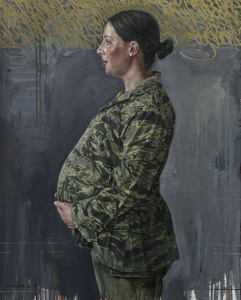By Rob Shaul
Over the years I’ve been asked several times by either female tactical and mountain athletes, or their husbands, to develop prenatal and postpartum training plans. While I’ve coached pregnant athletes, I’ve been hesitant to develop a prenatal-specific plan for women to do remotely. However, after getting asked again several times recently, I’ve decided to proceed.
 Like every new training plan, we began the process by looking at existing research and existing prenatal/postpartum training plans.
Like every new training plan, we began the process by looking at existing research and existing prenatal/postpartum training plans.
Published research we’ve revealed that prenatal fitness is overwhelmingly safe, and has many benefits.
However, the existing prenatal fitness programs available are not professionally designed, and correspondingly packaged as “Mommyfit” or “Babyfit” programs in pink and baby blue. It’s clear now why the female athletes familiar with MTI want another option.
We’ve already outlined a 34-week, prenatal, package of programming, but we want to make sure the intensity and volume we’ve drafted is appropriate for our athlete type – mountain and tactical female athletes professional about their fitness. The goal for these programs is to provide our pregnant athletes with a deliberate, challenging, and safe strength and conditioning which maintains health and fitness throughout pregnancy and into postpartum life. We want programming which flexes accordingly as pregnancy develops but still treats the expecting mother as an athlete.
We need your help. In order for us to get a clear picture of the demanding requirements of pregnancy and birth, we are asking the questions listed below. Many of these questions are targeted toward former pregnant athletes.
Fathers … if your wife/partner can help, please share this post with them.
Our questions are below.
Please email your replies to rob@mtntactical.com by Monday, January 11, 2021. Use “Prenatal/Postpartum Reply” in the subject line.
- Duration of the training program? We initially thought to start the pre-natal program at the 6-week mark of pregnancy and take it all the way until week 40. Does this make sense? Should we start earlier/later? Why?
- Should we design training cycles to align with pregnancy trimesters? We want to align programming with significant periods of physical changes and the trimester dates might not do this.
- When did you have to change and/or modify your fitness routine? What were the major changes to your body that you needed to accommodate for?
- What types of endurance activities did you do while pregnant? What was the duration of that activity? Did you run up until the day you delivered, or did you choose to engage in a non-impact cardio modality? Swim/bike/hike?
- What strength activities did you do while pregnant? How did you modify the weight and movements as pregnancy progressed? Are there any strength movements that you considered unsafe? Did you do any heavy strength training during your pregnancy? If so, what exercises and how long into pregnancy did you keep lifting. heavy?
- How active were you throughout pregnancy? How long were your typical workout sessions and how often did you train per week? Did you have to scale intensity/duration as pregnancy progressed and if so, how? Our current draft is a 7 day/week plan which begins with 60-90 minute sessions and tapers to 30-45 minute sessions during the last month of pregnancy.
- Did you experience physical ailments during pregnancy? Back pain, sciatica, fatigue? If so – what are your thoughts on addressing these with fitness programming?
- Did you incorporate yoga or a stretching routine? If so, how many times per week and what types of programs did you follow? Was this separate from your fitness?
- Would you recommend incorporating kegel exercises into the training plan? Or should we let athletes do these on their own?
- How long after giving birth did you wait to start exercising again?
- What were the major challenges (physical and mental) facing you getting back into exercise during the postpartum period?
- We’ve seen pregnant female athletes struggle with body image and other issues associated with pregnancy-related weight gain, morning sickness, fatigue, etc. It’s our hope that a professionally designed, challenging, but safe, strength and conditioning program during pregnancy will help with this. If you continued to train during pregnancy, was this your experience.
Thanks for your time. Again, please reply by Jan 11, 2021.